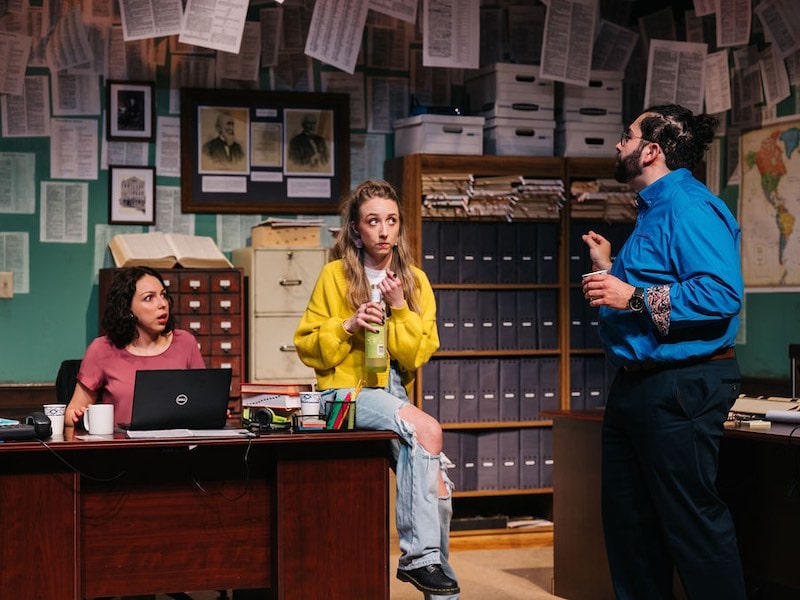There’s no pussyfooting around the titular B-word in Keegan Theatre’s current production. Did that grab you? A pre-show playlist features topical tunes like Marina’s “[I’m gonna be your] Bubblegum Bitch.” The very word is what incites the plot when a loose-lipped male boss is caught on a hot mic calling his female number-two “my bitch” and brouhaha ensues. What’s up with that? Playwright Jacqueline Bircher sets out to parse what’s fraught about the B-word in her scathingly funny Webster’s Bitch, a light-hearted sitcom that pulses and surprises with the sexual politics of language.
And what could be a more fitting setting for such a caustic comedy than an editorial office where diligent young word nerds devise definitions for a dictionary?

The scenic design by Matthew J. Keenan and Cindy Landrum Jacobs (with set dressing by Jacobs) speaks volumes: an out-of-date open office with desks decades old; a wall full of old-school card files, vertical storage folders, and bankers boxes; a surreal flurry of printed page proofs flying overhead — with only a slim laptop on each desk to give a clue that this is 2019.
Laboring here on tight deadline are lexicographers Gwen (Fabiolla Da Silva, whose emotional range, we will learn, is immense) and Nate (Andrés F. Roa, whose amusingly earnest gay dweeb steers clear of caricature … just). Meanwhile getting hilariously on their nerves is Gwen’s younger sister, Ellie, who is noisily and annoyingly killing time till quitting time when she and Gwen can go for drinks. Irene Hamilton as Ellie is the kind of intuitive and original comic actor who lights up their every scene on stage. In her clownishly torn Gen Z jeans (costume designer Shadia Hafiz’s best in show), Ellie is the play’s wise fool, the reality-checking voice “from the front lines of radical internet feminism,” and Hamilton nails it.
Video of the editor-in-chief’s sexist gaffe goes viral, Ellie gets it on her phone, and Gwen and Nate go into a damage-control dither. Enter Gwen and Nate’s immediate supervisor, Joyce, the woman the EIC publicly demeaned by name. Sheri S. Herren as Joyce embodies the power-suited, strained poise of a woman manager put in her place by a man in front of her subordinates, and it’s a class-act performance of nobility in ignominy.
Eventually, Frank, the errant boss, arrives, wearing a spiffy blue suit. As Frank, Timothy H. Lynch captures perfectly the starched insecurity of a man oblivious to the reputational catastrophe he has wrought and unconvincingly apologetic to the woman who bore the brunt.

Besides the play’s scenes of overall uproar and alarm about Frank’s verbal blunder, there are several especially strong scenes between two characters alone. One of them is Gwen’s long-sought meeting with Joyce to ask for a raise, which she does not get, and we see a depth of hurt and resolve in Gwen that suddenly brings her into focus as the play’s central character. A similarly compelling scene is when Joyce confronts Frank about his behavior and appeals for a promotion, which she does not get, and we see at last the rage Joyce has kept suppressed. Between those high-stakes scenes, we also can see, as though in a nutshell, how men on the workplace ladder keep women on lower rungs and how women in turn keep other women on lower rungs.
Susan Marie Rhea directs not only such seriously salient scenes with moving clarity but also the play’s funny bits with sky-high hilarity. Case in point: Ellie’s monologue about how, ever the rebel, she got fired from a gig as a flight attendant after improvising a wildly inappropriate preflight announcement, which on opening night stopped the show.
There’s a lot of fascinating info in Webster’s Bitch about how dictionaries are written and kept current — how much sourcing is required, how many different meanings the word “bitch” can have. (A running joke turns on whether Frank’s viral slur counts as a citation for the newly revised “bitch” entry.) The realistic texture that this office detail offers is a terrifically persuasive background against which we can appreciate the play’s not-to-be-missed meta-meaning:
Gender hierarchy. It’s a bitch.
Running Time: 90 minutes with no intermission.
Webster’s Bitch plays through May 5, 2024, at the Keegan Theatre, 1742 Church Street NW, Washington DC. Tickets ($50, with discounts available for patrons under 25 and over 62) are available online. Discounted rush tickets are also available at the door starting one hour before showtime.
Cast and production team bios can be found here (scroll down).
Webster’s Bitch
By Jacqueline Bircher
CAST
Gwen: Fabiolla Da Silva
Ellie: Irene Hamilton
Nick: Andrés F. Roa
Joyce: Sheri S. Herren
Frank: Timothy H. Lynch
Understudies: Alicia Grace (Gwen), Carianmax Benitez (Ellie), Gary Dubreuil (Nick/Frank), Cate Brewer (Joyce)
PRODUCTION TEAM
Director: Susan Marie Rhea
Assistant Director & Dramaturg: Charlotte La Nasa
Co-Scenic Designer: Matthew J. Keenan
Co-Scenic Designer & Properties / Set Dressing Designer: Cindy Landrum Jacobs
Lighting Designer: Dean Leong
Sound Designer: Brandon Cook
Costume Designer: Shadia Hafiz
Stage Manager: Mary Doebel




